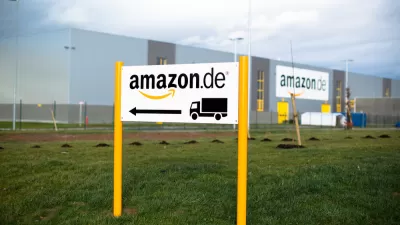Greenhouse Gas Emissions

Transportation Catching Industry as the Leading Cause of Greenhouse Gas Emissions
A new study from University of Michigan researchers tallies, and then compares, the greenhouse gas emissions from different sectors of the U.S. economy.
Greatest Barrier to Reducing Greenhouse Gas Emissions in California: Gas Prices
Gas prices are down and sales are up, and greenhouse gas emissions from transportation, the largest source of the state's emissions, are up, even though overall they dipped. In addition to increased driving, sales of EVs and hybrids dropped.

EPA Releases Final Methane Rule for New and Modified Oil and Gas Wells
While the methane reduction targets are the same as the draft rule released last August (i.e., 40-45 percent reduction of 2012 levels by 2025), the new rule removes exceptions, resulting in a 30 percent improvement in reductions of methane.
Methane Emissions Replace CO2 Emissions— Is This Progress?
For the first time, electricity generated from burning natural gas will surpass coal, largely due to fracking of shale. While that means that carbon dioxide emissions will continue to drop, it also means that methane emissions will increase.
The Erosion of Public Trust
The damage caused by Michigan environmental agencies charged with protecting public health extend far beyond Flint. Residents suffering health effects from a huge natural gas leak in Southern California see parallels with the lead poisoning crisis.
New York's Biggest Challenge for Emission Reduction Goals: Green Building
About 80 percent of New York City's greenhouse gas emissions come from its building stock, so the city's goal to cut emissions 80 percent by 2050 will hinge on aggressive retrofitting requirements in addition to new green building standards.
Estimated Cost Savings of 10 Percent of People Riding Bikes: $24 Trillion
The mode share for bikes in urban environments around the world currently sits around 6 percent. A new report out of a university located in one of the most bike-friendly cities in the country quantifies the benefits of 10 percent mode share.

The Hidden Costs of Building Green
New green buildings may be de riguer, but preservation does less harm.
How the Coal Industry Collapsed
The writing is on the wall for what's left of the coal industry.
Study: Golden State Should Change Name to Greenest State
California's economy is not only the "least carbon-intensive" in the United States, it's the second lowest in the world when measured per economic output, according to a new study that evaluates economics and environment.
Carbon Dioxide Levels Reach Record Level in March
The last time carbon dioxide levels were this high was a million years ago. The global community needs to reduce emissions by 80 percent to stop the increase in CO2 levels. The data was reported by the National Oceanic and Atmospheric Administration.
New Methane Emission Regulations Aim for 45 Percent Reduction by 2025
President Barack Obama hopes to add to his "climate legacy" by having the EPA adopt the nation's first regulations to reduce methane emissions, the second most prevalent greenhouse gas emission after carbon dioxide, but far more powerful.
Nebraska Supreme Court OKs Keystone XL; U.S. Senate has the Next Move
The House voted for the tenth time to approve the pipeline, and a split decision by the Nebraska Supreme Court removes a key objection of President Barack Obama to ruling on Keystone XL. The Senate begins debate Monday.
International Climate Accord Reached in Lima
Known as the Lima Accord, after the capital of Peru where representatives from 200 nations met for two weeks, a deal was reached to reduce greenhouse gas emissions in preparation for talks to be held in Paris in December. But is it strong enough?
A New Era in California for Evaluating Transportation Emissions
An appellate court's rejection of SANDAG's $200 billion sustainable communities plan holds far-reaching implications for how regional planners evaluate greenhouse gas emissions from transportation to meet SB 375 requirements to the year 2050.
California Fuel Consumption Rises—First Time in Eight Years
For the first time since 2006, gasoline consumption in California increased from the prior fiscal year. From July 2013 through June 2014, consumption increased 1 percent.
The United Nations Studies Urban Emissions Monitoring
Urban emissions researchers have been invited to speak at the UN Climate Conference in Lima. Their findings: through focused and networked monitoring, cities can make real inroads on cutting carbon.
How Much Will Gas Prices Rise in California After Cap and Trade?
It could be as low as nine cents per gallon, or as high as 76 cents, writes UC Berkeley energy expert Severin Borenstein. On January 1, transportation fuels are included under California's landmark cap and trade program.
How Los Angeles' Urban Parks Battle Climate Change
An overview of how Los Angeles County’s Department of Parks and Recreation is creating projects that tackle the effects of climate change, by planner Clement Lau.
Successor Bill to California's Landmark Climate Change Legislation Introduced
AB 32, California's landmark climate change legislation, expires in 2020. Senator Fran Pavley (D-Calabasas), co-author of AB 32 in 2006, has teamed-up with Senator Ricardo Laro (D-Long Beach) to write a bill to continue emission reductions to 2030.
Pagination
Urban Design for Planners 1: Software Tools
This six-course series explores essential urban design concepts using open source software and equips planners with the tools they need to participate fully in the urban design process.
Planning for Universal Design
Learn the tools for implementing Universal Design in planning regulations.
Central Transportation Planning Staff/Boston Region MPO
Heyer Gruel & Associates PA
Institute for Housing and Urban Development Studies (IHS)
City of Grandview
Harvard GSD Executive Education
Regional Transportation Commission of Southern Nevada
Toledo-Lucas County Plan Commissions


































